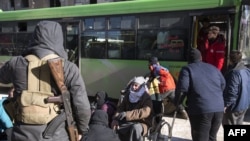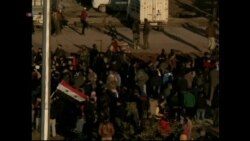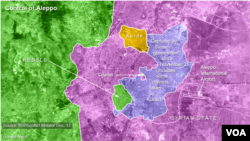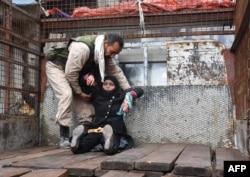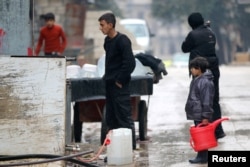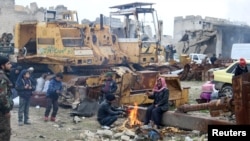Ambulances and green government buses moved into the last rebel-held areas of Aleppo, Syria on Thursday as part of an operation to evacuate civilians and rebel fighters.
The International Committee of the Red Cross and the Syrian Arab Red Crescent Society said they were involved in evacuating about 200 wounded, some of them with critical injuries.
U.N. humanitarian envoy Jan Egeland told reporters he hoped to see the start of a "last and successful attempt" at evacuations from eastern Aleppo, which opposition fighters seized in 2012.
WATCH: Buses arrive in rebel-held area of Aleppo
He said those being moved from the city included medical evacuations of wounded and sick people, other vulnerable civilians, and the rebel fighters. Most of them were bound for Idlib, while others may opt to go to Turkey.
The operation came after an agreement was reached late Wednesday, but was far from certain to be put into motion after a planned evacuation early Wednesday failed to materialize and a cease-fire in Aleppo failed.
There was more violence reported early Thursday, with activists and local medical officials saying pro-government forces fired on an ambulance that tried to leave rebel-held territory, wounding at least three people.
The final departure of rebels from Aleppo would mark a major victory for Syrian President Bashar al-Assad. His forces have been pressing a Russia-backed military campaign that accelerated in recent weeks as they captured more and more territory from the opposition.
Years of fighting and a government siege of Aleppo have left much of the city in rubble and drawn alarm from the international community and aid groups worried about the thousands of people in need of food and medical attention.
Specter of 'war crimes'
U.N. Human Rights Commissioner Zeid Ra’ad al Hussein said the resumption of fighting early Wednesday was appalling, and that "the resumption of extremely heavy bombardment by the Syrian government forces and their allies on an area packed with civilians ... most likely constitutes war crimes."
Zeid demanded that the Syrian government provide medical aid to residents of Aleppo wounded during the bombardment, as required by international law, and said, "The way this deal was dangled in front of this battered and beleaguered population -- causing them to hope they might indeed live to see another day -- and then snatched away just half a day later is also outrageously cruel."
The Syrian Observatory for Human Rights, a group based in Britain that collects reports about the prolonged civil war, said there were "very intense clashes on every front line," both in rebel-held and government-controlled parts of the city. Casualties were reported on both sides.
How new deal came about
Members of the Nureddin al-Zinki rebel group told the French news agency the new cease-fire deal was reached through negotiations between the Russian military and the Turkish Red Crescent Society.
Other reports said Iran, another major supporter of the Assad regime, held up the new cease-fire agreement until it had assurances that evacuations from Aleppo would be carried out simultaneously with the rescue of wounded people in two Shi'ite villages under siege by rebel forces.
Abdul Salaam Abdul Razak, a military spokesman for the Nureddin al-Zinki group, said evacuations from the villages in Idlib province were confirmed late Wednesday, assuring the exodus from eastern Aleppo could begin at dawn Thursday.
An official of another rebel group, Jabha Shamiya, told Reuters about 1,000 wounded people were expected to leave Aleppo first, and that the entire evacuation could be completed within three days.
Trading blame
Russia blamed the rebels for breaking the cease-fire early Wednesday, allegedly by attacking Syrian government positions. Turkish President Recep Tayyip Erdogan said it was Syrian government forces that began the attack.
Russian Foreign Minister Sergei Lavrov told U.S. Secretary of State John Kerry by phone Wednesday afternoon that the Syrian government was willing to provide a safe exit for civilians and rebel fighters, but the rebels refused to adhere to the cease-fire, according to a statement from the Russian foreign ministry.
Russian and U.S. diplomats have been gathered in Geneva for several days discussing a long-term peace deal for Aleppo, but by Thursday morning those conversations had broken down, according to Russian Deputy Foreign Minister Sergey Ryabkov.
"They have been suspended," Ryabkov reportedly told Russian state news agency TASS.
The discussions between the two countries' diplomats had been ongoing since Sunday.
Turkish Foreign Minister Mevlut Cavusoglu said Wednesday that his country, Russia and Iran would hold a summit in late December in the hope of finding a political solution to the Syrian crisis.
Cavusoglu told an interviewer for the private Turkish channel TGRT the summit would take place December 27 in Moscow.
*Also see: In Photos: Aleppo Evacuation




